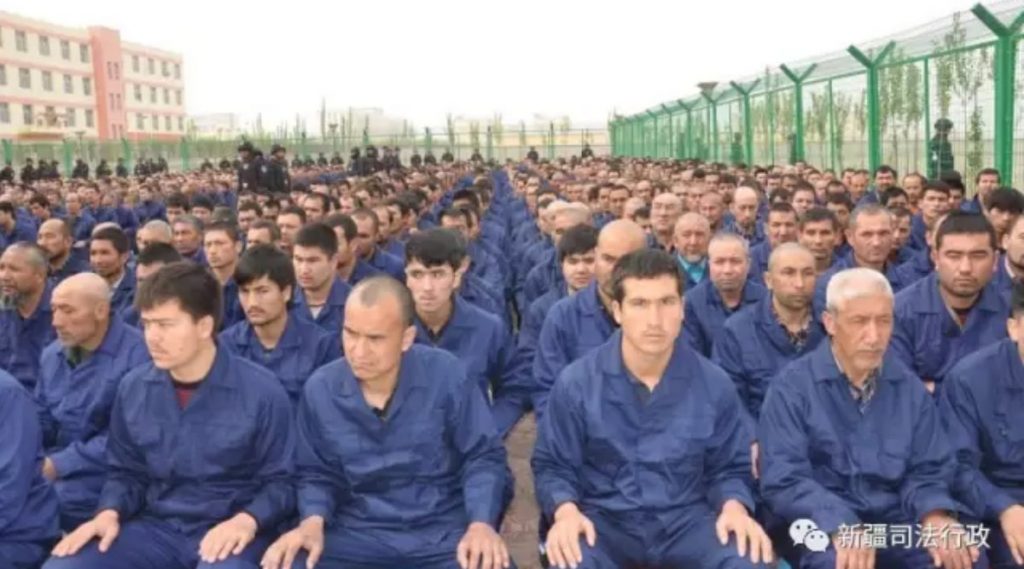
Summary: China uses a policing program called the Integrated Joint Operations Platform (IJOP) that aggregates data about people in the Xinjiang region from a variety of sources and flags those it deems to be a potential threat. The Human Rights Watch (HRW) researchers who accessed the list found that the program flagged people as suspicious for practicing Islam, using peer-to-peer file sharing applications such as Zapya, facial recognition systems by tech giant Huawei and artificial intelligence from Megvii which can monitor and track the minority Uighurs.
The Chinese government is using IJOP to compile a massive database of personal information from a range of sources, apart from these apps. They include national identification documents, Xinjiang’s countless checkpoints, closed-circuit cameras with facial recognition, spyware that the police force Uighurs to install on their phones. In response to the expose and sanctions by various countries over its treatment of Uighurs, China has haughtily brushed them off as unfounded and as a gimmick.
A recent report by Human Rights Watch (HRW) shows how a new list of Uighur detainees believed to be leaked from Xinjiang suggests that China continues to use sophisticated data collection technology to identify and arbitrarily detain members of the Muslim minority, the Uighur’s, which consequently aids in their repression.
HRW has obtained a list of 2,000 detainees nicknamed the ‘Aksu List’ from Xinjiang’s Aksu prefecture who were flagged by the Integrated Joint Operations Platform (IJOP), a policing program that aggregates data about people in the region from a variety of sources and flags those it deems to be a potential threat. The Aksu List, dated around late 2018, follows another leak earlier this year from Karakax county, which listed people detained for having relatives abroad. The Aksu List provides further insights into how China’s brutal repression of Xinjiang’s Turkic Muslims is being turbocharged by technology, as per HRW researcher Maya Wang.
Maya Wang wrote and Twitter on the expose. “The Aksu List shows how Xinjiang’s big data system, Integrated Joint Operations Platform, selected people for detention”, she tweeted. “This research follows 2 other pieces on HRW did on Xinjiang’s big data system–one in Feb 2018 based on documentary research; another in May 2019 based on reverse engineering of the IJOP mobile phone app”, she wrote.
“People are detained for nothing more than having prayed in 1985 or worn a veil in 2013. We conclude that the IJOP is “really just a pseudo-scientific fig leaf for the Chinese government to justify vast repression of Turkic Muslims.” The Chinese government owes answers to the families of those on the list, why were they detained, and where are they now, her statement said.
Apps and AI aiding repression
The HRW researchers found that the program flagged people as suspicious for practicing Islam, using peer-to-peer file sharing applications such as Zapya, traveling, or being young, that is, “born after the 1980s.” Such findings match the Chinese surveillance and mass internment program revealed in classified government documents obtained by the International Consortium of Investigative Journalists last year.
In 2018, the United Nations estimated that China held more than 1 million Uighurs and members of other Turkic minorities in mass-detention camps. The China Cables investigation detailed China’s plan to control, detain and indoctrinate Uighurs, using prison-like structures and highly sophisticated mass-surveillance technology.
Additional details of China’s pervasive use of technology to target Uighurs were uncovered last week by surveillance research firm IPVM. The researchers found a confidential document by tech giant Huawei and artificial intelligence firm Megvii documenting the companies’ work on a facial recognition system that can monitor and track the Muslims flagged as suspicious. Among the system’s many functions was one called “Uyghur alert,” which could identify a subject’s ethnicity and be used to flag a member of the minority group to authorities, according to IPVM. IPVM is the World’s Leading Source of Video Surveillance and Security Information.
Huawei told IPVM that the company was conducting a test and operates in compliance with the law. Megvii ー which was blacklisted by the U.S. in 2019 for its alleged role in the surveillance of Uighurs ー denied its technologies are designed to “target or label ethnic groups.”
The 2019 China Cables

In November 2019, a leak of highly classified Chinese government documents, the China Cables, revealed that since at least July 2016, Chinese authorities have been targeting users of the Zapya app, known in Chinese as Kuai Ya (fast tooth), as part of their crackdown against the Muslim Uighur population. Officials have closely monitored the app on some Uighurs’ phones and flagged its users for further investigation, according to leaked documents obtained by the International Consortium of Investigative Journalists and shared with 17 media partners.
Before Zapya, Chinese authorities flagged other mobile apps, including WeChat, developed by Chinese conglomerate Tencent Holdings, as potential threats to political stability. WeChat, a Chinese messaging and social media app became popular as a way to create virtual communities and discussion groups about a variety of topics, including religion. Uighurs were sentenced to prison for using WeChat to teach about Islam, according to media reports.
One document included in the China Cables instructs government officials to locate and arrest people described as “violent terrorists and extremist elements who used the ‘Kuai Ya’ software to spread audio and video with violent terroristic characteristics.”
ICIJ reported that the leaked documents made public for the first time the Chinese Communist Party’s operational plans for the largest civilian mass internment of an ethnic-religious minority since World War II. ICIJ report also says that among the documents are bulletins issued by Xinjiang’s Communist Party Committee. They outline the central role of surveillance technology in what experts fear is a chilling laboratory for authoritarian tactics ripe for export worldwide, says ICIJ.
According to the New York-based human rights group, the Chinese government is using IJOP to compile a massive database of intimate personal information from a range of sources. Those sources include national identification documents, Xinjiang’s countless checkpoints, closed-circuit cameras with facial recognition, spyware that the police force Uighurs to install on their phones, “Wi-Fi sniffers,” which collect identifying information on smartphones and computers, and package delivery, according to the report. The system also has a mobile app that police and other officials use to run background checks and communicate with the IJOP in real-time.
Countries impose sanctions on China
In June, U.S. President Donald Trump authorized sanctions against China over the mass detention of Uighurs. The U.S. later sanctioned four top Chinese officials considered the architects of the country’s mass internment camps. Among them was Zhu Hailun, who formerly led the Political and Legal Affairs Commission of the Communist Party in the Xinjiang region. Zhu’s signature was on five of the six leaked government files obtained by ICIJ.
The U.S. has also imposed trade restrictions on dozens of Chinese companies that are believed to have a role in the crackdown against the Muslim minorities, including forced labor and high-technology surveillance.
In October, 39 countries including Japan, European Union member states, New Zealand, and others urged China to respect Uighurs’ human rights and allow “unfettered access” to Xinjiang for independent observers. Separately, a group of British lawmakers urged their government to sanction Chinese officials responsible for human rights violations. A group of British lawmakers too called for sanctions against Chinese officials responsible for human rights violations against the Uighur minority and for trade restrictions on goods made with forced Uighur labor.
In July 2020, lawyers representing two Uighur activist groups filed a complaint with the ICC. Apart from the ICIJ report on China, the lawyers say they had evidence of Human Rights abused by China which includes “countless” eye-witness accounts and reports by researchers and journalists of forced sterilization, torture, and forced labor.
In November, a group of more than 60 parliamentarians from 14 countries joined the appeal and sent a letter to the ICC prosecutor to “call on the ICC to play its part in ensuring that the perpetrators of the most egregious human rights abuses are held accountable and prevented from acting with impunity.”
On 9 November 2020, 63 IPAC parliamentarians representing 14 countries wrote to the Chief Prosecutor of the International Criminal Court (ICC) urging her to accept a complaint alleging genocide against Uyghurs by China.
The complaint, brought by Rodney Dixon QC, provided detailed and extensive evidence that the Chinese government may be committing crimes amounting to genocide and other crimes against humanity against the Uyghur and other Turkic peoples. Suspected abuses include the mass incarceration of millions of Uyghurs, widespread forced labor, and the forced sterilization of ethnic minority women. Full text is available here.
In response to the expose and sanctions, China has haughtily brushed them off as unfounded and as a gimmick. Chinese spokespersons have never openly spoken about the allegations have always refused to take direct questions on the treatment of Muslims in Xinjiang.
